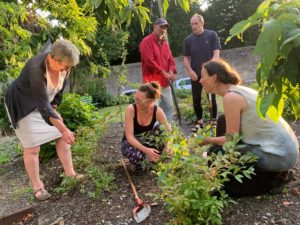The Zero Carbon Cumbria Community Climate Grants have been awarded to 11 organisations over the past few months. Earlier this year, we updated you on the two large grants (up to £10,000) awarded to community projects working to reduce carbon emissions in Cumbria.
Now, we thought it was about time to give you a flavour of some of the other action taking place as a result of the grants. These projects are recipients of either the small or medium sized grants. While this is not all the projects that have been funded, they provide a snapshot of the brilliant initiative of Cumbrians working to a more sustainable future.
Growing for the community
A group in Greysouthen was awarded £750 to revitalise a community garden. Before this, a patch of public land was simply going to waste. The locals viewed this as a wasted opportunity and parish councillor Lee Jackson was struck by how dependent he was on getting in a car to go to the shops three miles away to purchase small quantities of herbs in plastic packaging. They thought, ‘why not give the land a purpose – to grow food for the local community’?
The money from the grant has been used to buy tools and plants. So far, a healthy supply of rosemary, thyme, parsley, sage, blackcurrants, gooseberries, figs, pears and apples are getting established within the garden. Neighbours are performing ongoing maintenance and donating their water, though a new hose is on the shopping list. The group also hope to produce an information board about the community garden using the funds from the Community Climate Grant. This will raise awareness of the ‘grow local, eat local’ rationale behind the project.
When a substantial crop is yielded, the group hope that the garden can provide free, low carbon food for the vulnerable people in the area. They have also ensured that the parish council will pay for a part time gardener for the plot, creating local low carbon employment, as well as ensuring that the garden continues to grow and flourish for years to come.
Lee said: “A small amount of money can have a big impact on the community. As the garden develops, we hope that more people will understand the importance of growing food locally, and will be inspired to take more actions to reduce their carbon footprint and do the right thing by the environment. We’d love the project to create a legacy which continues to bring people together, perhaps it could be the basis for a harvest festival celebration?
“Applying for the Community Climate Grant was a straightforward process and the Community Garden for Climate was a good way to start to raise issues and get people involved in tackling the climate crisis. I’d definitely recommend other groups to have a go!”
Lighting the way
The Field Studies Council (FSC) at Castle Head received £750 to install solar panels to power a new lighting system.
The FSC is home to a range of outdoor activities including a high ropes area visitors can traverse in a raised course. The new lights will illuminate the high ropes area during dark evenings using only power generated from the solar panels. This will allow the area to be open for longer once the system is installed. The programmes available to guests can be more flexible with timings and they will gain a new experience swinging the ropes at night.
The centre is part of an environmental education charity with a commitment to meet net-zero targets though is also a Grade 2 listed building, meaning any adaptations must be carefully considered and are expensive.
Student placement Oliver Peach came up with the idea for the solar powered lighting system as a way to show the benefits of renewable energy. He hopes that the success of the project will be seen by the many students of all ages that regularly visit the FSC on trips. The funding also helped to create a display board illustrating how solar energy works and why renewables are an important part of fighting climate change. Through this, the project will educate the next generation on climate solutions and Oliver hopes schools will consider installing their own solar panels as a result.
Oliver said: “the Community Climate Grants were easy to apply for and I think it’s really important for charities to use these small grants as stepping stones. Every step in the right direction is a good step – the project demonstrates our commitment to cutting carbon emissions and hopefully will inspire many other people. It’s important to keep talking and keep educating, as the more people are motivated to make a difference the easier it will be to make that transition to Net Zero.”
Looking to the future
Drop Zone Youth Project were granted £1,608 to fund their accredited programme of education on climate change to be delivered to young people.
After having moved to a new premises in Barrow, Drop Zone began looking for ways to be more sustainable in the new building. Young people involved with the discussion felt that there was a need for a long term commitment to make the building viable for future generations of young people to access their support.
The money is being used to fund a pilot project raising awareness of climate change among young people. Working with agencies like Greener Schools Art Gene and the Wildlife Trust, attendees will undertake a 12 week project from September. This will include activities like tree planting, managing an allotment and recycling. Because they can use the funding to pay for speakers and materials, they hope that the course will educate the young people in carbon reduction.
The young people who complete the project will gain an accreditation to help them with future prospects.
Drop Zone are also using the funding to look into carbon reduction for their premises, including investigating solar panel feasibility and shifting to a paperless operation.

